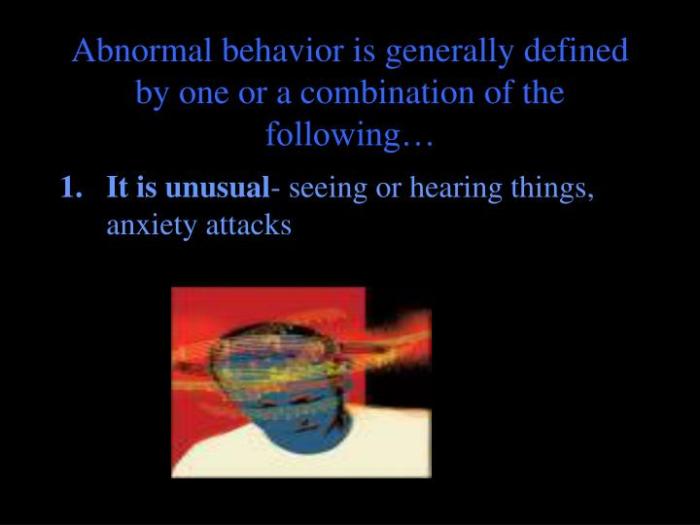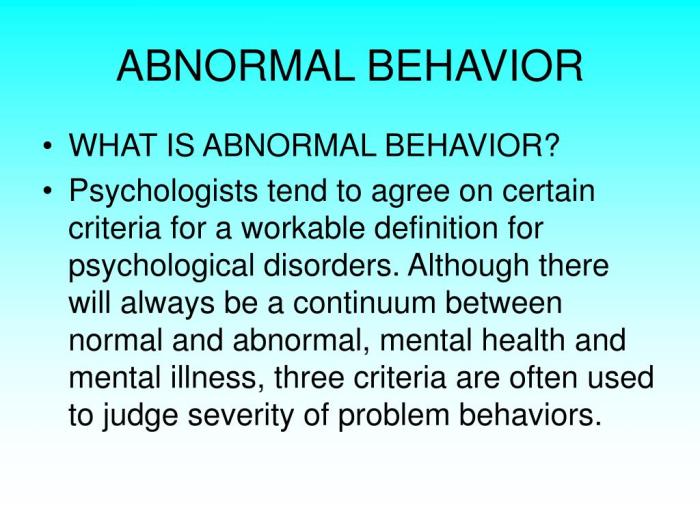Which of the following statements is true regarding abnormal behavior? This question delves into the intriguing realm of abnormal behavior, a topic shrouded in mystery and misconceptions. Abnormal behavior, a deviation from societal norms, raises fundamental questions about the nature of mental health, its causes, and effective treatments.
Join us as we embark on an exploration of this captivating subject, unraveling the complexities of abnormal behavior and gaining a deeper understanding of its profound impact on individuals and society.
Definitions of Abnormal Behavior

Abnormal behavior is defined as behavior that deviates significantly from the social and cultural norms of a given society. It can be characterized by:
- Unusual thoughts, feelings, or actions
- Significant impairment in social or occupational functioning
- Causing distress or harm to oneself or others
Examples of behaviors that may be considered abnormal include:
- Hallucinations (seeing or hearing things that are not there)
- Delusions (fixed, false beliefs)
- Compulsive behaviors (repetitive actions that cannot be controlled)
- Extreme mood swings
- Violent or aggressive behavior
Causes of Abnormal Behavior

The causes of abnormal behavior are complex and can be attributed to a combination of biological, psychological, and social factors.
Biological Factors
- Genetics: Certain genetic disorders, such as schizophrenia and autism, have been linked to an increased risk of developing abnormal behavior.
- Brain chemistry: Imbalances in neurotransmitters, such as serotonin and dopamine, can contribute to mood disorders and anxiety disorders.
Psychological Factors, Which of the following statements is true regarding abnormal behavior
- Childhood experiences: Traumatic or neglectful childhood experiences can increase the likelihood of developing mental health problems in adulthood.
- Personality traits: Certain personality traits, such as neuroticism and introversion, can make individuals more vulnerable to abnormal behavior.
Social Factors
- Social stress: Major life stressors, such as job loss or divorce, can trigger abnormal behavior in susceptible individuals.
- Social support: Lack of social support can exacerbate mental health problems and make recovery more difficult.
Classification of Abnormal Behavior
Abnormal behavior can be classified in several ways, including:
By Symptoms
- Mood disorders: Disorders characterized by disturbances in mood, such as depression and bipolar disorder.
- Anxiety disorders: Disorders characterized by excessive fear or anxiety, such as generalized anxiety disorder and panic disorder.
- Psychotic disorders: Disorders characterized by a loss of contact with reality, such as schizophrenia and schizoaffective disorder.
By Severity
- Mild: Behavior that causes only minor impairment in daily functioning.
- Moderate: Behavior that causes significant impairment in daily functioning.
- Severe: Behavior that makes it impossible to function independently.
By Underlying Causes
- Organic: Behavior caused by a physical or medical condition, such as brain damage or substance abuse.
- Functional: Behavior caused by psychological or social factors, without a known physical cause.
Diagnosis of Abnormal Behavior

Diagnosing abnormal behavior involves a thorough assessment by a mental health professional, typically a psychiatrist or psychologist.
The diagnostic process includes:
- Interviewing the individual to gather information about their symptoms, history, and current situation.
- Observing the individual’s behavior and interactions.
- Administering psychological tests to assess cognitive functioning, personality traits, and emotional state.
Challenges and limitations in diagnosing abnormal behavior include:
- Subjectivity: The diagnosis of abnormal behavior is often based on the subjective judgment of the mental health professional.
- Comorbidity: Many individuals with abnormal behavior have multiple co-occurring disorders, which can make diagnosis and treatment more complex.
Treatment of Abnormal Behavior
Treatment for abnormal behavior depends on the specific diagnosis and the individual’s needs.
Types of treatment include:
Psychotherapy
- Cognitive-behavioral therapy (CBT): Helps individuals identify and change negative thought patterns and behaviors.
- Psychodynamic therapy: Focuses on exploring unconscious conflicts and past experiences that may be contributing to abnormal behavior.
- Interpersonal therapy (IPT): Addresses relationship issues and communication patterns that may be exacerbating mental health problems.
Medication
- Antidepressants: Used to treat mood disorders, such as depression and anxiety.
- Antipsychotics: Used to treat psychotic disorders, such as schizophrenia and bipolar disorder.
- Mood stabilizers: Used to stabilize mood swings in bipolar disorder.
Hospitalization
In some cases, hospitalization may be necessary to provide intensive treatment and protect the individual from harm to themselves or others.
Ethical Considerations in Abnormal Behavior
Ethical considerations in the diagnosis and treatment of abnormal behavior are crucial.
Important ethical principles include:
- Informed consent: Individuals should be fully informed about their diagnosis, treatment options, and potential risks and benefits before making decisions about their care.
- Confidentiality: Information about an individual’s mental health should be kept confidential, except in cases where there is a risk of harm to themselves or others.
- Respect for patient autonomy: Individuals should have the right to make decisions about their own treatment, even if those decisions are not in the best interests of the mental health professional.
FAQ Corner: Which Of The Following Statements Is True Regarding Abnormal Behavior
What is the definition of abnormal behavior?
Abnormal behavior refers to patterns of thinking, feeling, or acting that deviate significantly from societal norms and expectations, causing distress or impairment in an individual’s life.
What are the main causes of abnormal behavior?
Abnormal behavior can result from a complex interplay of biological (e.g., genetics, brain chemistry), psychological (e.g., trauma, personality traits), and social factors (e.g., environmental stressors, cultural influences).
How is abnormal behavior diagnosed?
Diagnosis involves a comprehensive evaluation by mental health professionals using interviews, observations, psychological tests, and a review of an individual’s history and symptoms.
What are the ethical considerations in the treatment of abnormal behavior?
Ethical considerations include obtaining informed consent, maintaining confidentiality, respecting patient autonomy, and ensuring that treatments are evidence-based and minimize harm.